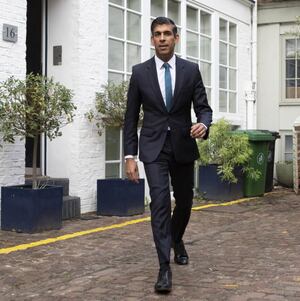A senior British government minister had a coronavirus test for his child couriered to his home when the pandemic was raging and national panic was being stoked by a shortage of the crucial tests, a trove of WhatsApp messages leaked to the Daily Telegraph has revealed.
Then-Cabinet Secretary Jacob Rees-Mogg, who has been widely mocked as the “Minister for the 19th Century” owing to his anachronistic style, dress, and Victorian affectations, had the test personally delivered to his house by courier on Sept. 10, 2020, on the orders of a key aide to Health Secretary Matt Hancock.
Twenty people died of COVID in the U.K. on that day, official records show. With the country about to be plunged into a second wave of the disease, there was widespread panic as demand for testing services soared.
Just two days before the Rees-Mogg test was specially sent out, the British director of testing had made a humiliating statement offering “heartfelt apologies to anyone who cannot get a COVID test at present.” The country’s laboratories were working through a backlog of 185,000 tests at the time.
The test was whisked round to the Rees-Mogg abode after a test taken earlier by one of his children had been lost. Hancock’s special adviser responded to the lost test by organizing the courier who not only delivered a new test that evening but waited for the test to be taken before driving it directly to the testing lab. The test came back negative.
The revelation is just one of many astonishing claims being made in British newspaper the Daily Telegraph on Wednesday after a trove of more than 100,000 WhatsApp messages from the former health minister were released by his former ghostwriter in a stunning betrayal.
The ghostwriter, Isabel Oakeshott, said she felt morally obliged to release the messages, which were given to her by Hancock when she was helping him write his autobiography, out of fear the official inquiry into the government’s handling of the pandemic would be a “colossal whitewash.”
Oakeshott boasts that the communications “treasure trove” includes conversations with Boris Johnson, who was then prime minister; Rishi Sunak, who is now PM but was then chancellor; and “almost every other member of the Cabinet.”
She writes: “Taken together, the messages reveal the turmoil inside Downing Street and the Department of Health and Social Care as infection rates spiraled and ministers and their advisers flailed around trying to figure out how to respond.
“They expose the fear and frustrations of a vacillating prime minister as he lurched from optimism and lockdown skepticism to pessimism and lockdown zealotry; the behind the scenes battles to establish the testing and contact tracing systems required to tackle the virus... As the pressure on politicians and policymakers mounted, tempers frayed. As the population was imprisoned and the sick lay dying, ministers and political operatives clashed egos, indulged in petty turf wars, sniped about their own colleagues and obsessed about how they appeared in the media.”
Headlines to so far emerge from the messages include that Matt Hancock rejected advice from the chief medical officer to test people going into care homes, a catastrophic error that is believed to have led to thousands of unnecessary deaths: The Telegraph says that between April 17 and Aug. 13, 2020, when the advice was changed, “a total of 17,678 people died of Covid in care homes in England.”
Hancock has claimed his “doctored” and “stolen” WhatsApp messages have been “spun to fit an anti-lockdown agenda.”
A spokesman for Hancock said: “It is outrageous that this distorted account of the pandemic is being pushed with partial leaks, spun to fit an anti-lockdown agenda, which would have cost hundreds of thousands of lives if followed.
“What the messages do show is a lot of people working hard to save lives. The full documents have already all been made available to the inquiry, which is the proper place for an objective assessment, so true lessons can be learned.”





